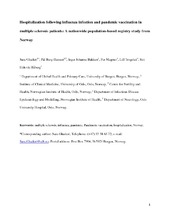Hospitalization following influenza infection and pandemic vaccination in multiple sclerosis patients: a nationwide population-based registry study from Norway
Ghaderi, Sara; Berg-Hansen, Pål; Bakken, Inger Johanne Landsjøåsen; Magnus, Per; Trogstad, Lill; Håberg, Siri Eldevik
Peer reviewed, Journal article
Accepted version
Permanent lenke
https://hdl.handle.net/1956/22584Utgivelsesdato
2020Metadata
Vis full innførselSamlinger
Sammendrag
Patients with multiple sclerosis (MS) are at increased risk of infections and related worsening of neurological function. Influenza infection has been associated with increased risk of various neurological complications. We conducted a population-based registry study to investigate the risk of acute hospitalization of MS patients in relation to influenza infection or pandemic vaccination in Norway. The entire Norwegian population in the years 2008–2014 was defined as our study population (N = 5,219,296). Information on MS diagnosis, influenza infection and vaccination were provided by Norwegian national registries. The self-controlled case series method was used to estimate incidence rate ratios (IRRs) with 95% confidence intervals (95% CI) in defined risk periods. 6755 MS patients were identified during the study period. Average age at first registration of an MS diagnosis was 51.8 years among men and 49.9 years among females (66.9%). The IRR for emergency hospitalization among MS patients the first week after an influenza diagnosis was 3.4 (95% CI 2.4–4.8). The IRR was 5.6 (95% CI 2.7–11.3) after pandemic influenza, and 4.8 (95% CI 3.1–7.4) after seasonal influenza. Pandemic vaccination did not influence risk of hospitalization [IRR within the first week: 0.7 (95% CI 0.5–1.0)]. Among MS patients, influenza infection was associated with increased risk for acute hospitalization while no increased risk was observed after pandemic vaccination. Influenza vaccination could prevent worsening of MS-related symptoms as well as risk of hospitalization.
